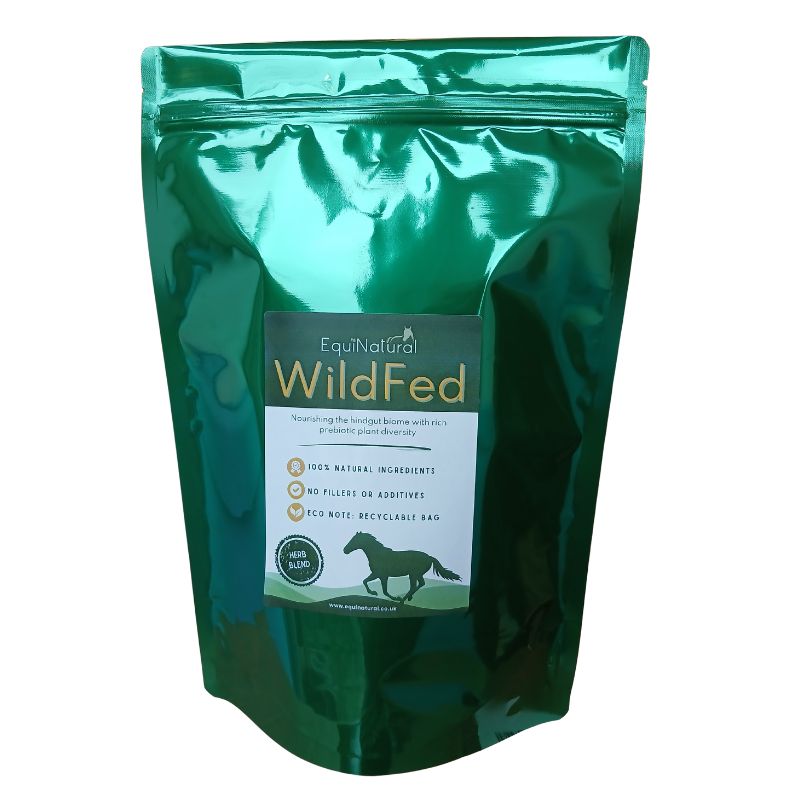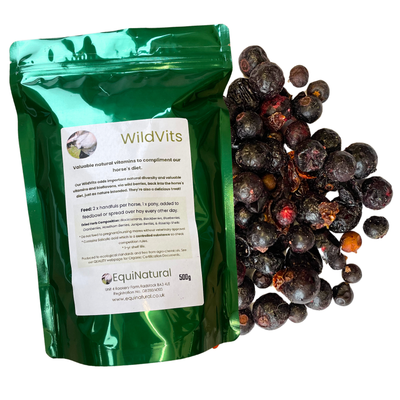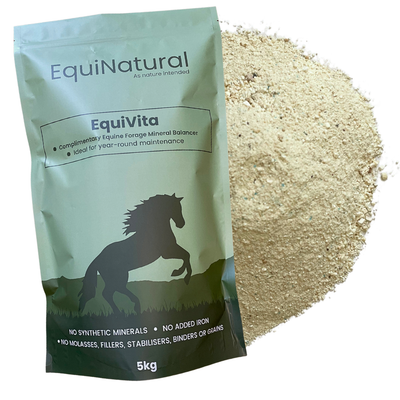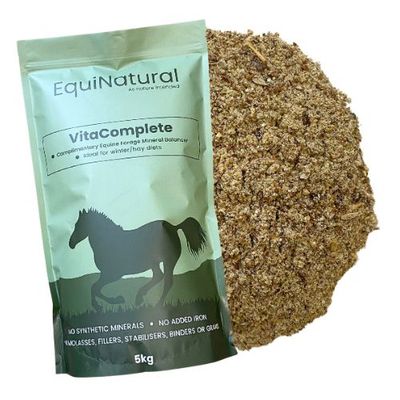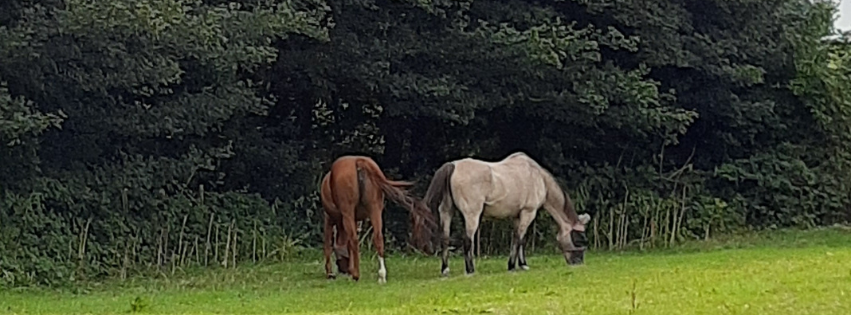WILDFED 🍂NOVEMBER'S 20% SALE *Nature-fed, fibre-rich, biome-balancing - nourishing the hindgut biome with rich prebiotic plant diversity

Nature's nutrient buffet, WildFed mimics the diverse diet of wild horses, offering a variety of natural prebiotic botanical roughage to plug the nutritional gaps in modern equine diets.
Modern diets of domesticated horses lack the diversity of their wild ancestors, leading to challenges in gut health and vitality.
Packed with phytonutrients from barks, mosses, roots, and leaves, WildFed is a must to support a healthy hindgut microbiome to keep the gut ecosystem resilient, balanced, and thriving - just as nature intended.
✨ “A perfect addition for my hedge-munching horse - filling the natural gap in his diet.” Amy W.
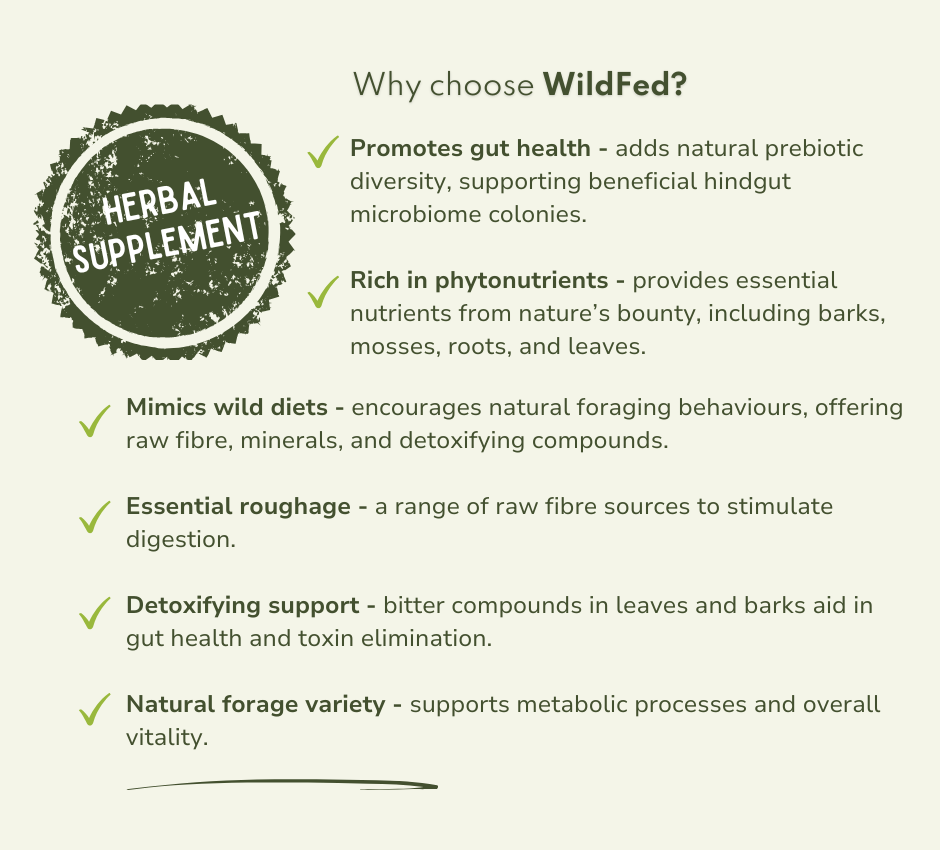
Overview
When horses lived in the wild, they ate a wide range of diverse foods - everything from moss, leaves, nuts, berries, flowers, grains, and barks, to get variety and essential nutrients into their diets to support their metabolism.
Today ? We feed our domesticated horses the same standard diet, grass/hay, day in. day out, which means much of their natural diverse roughage diet is missing. Given the opportunity, any horse would be looking for variety and diversity wherever possible.The gut system of our modern-day domesticated horse is no different to that of the wild horse from millions of years ago, their digestion being based on the utilisation of different plants, and their natural diet including much more than just grasses - watch any horse enjoying a happy nibble on leaves and branches of various trees.
This not only gives them raw fibre roughage but also important minerals and phytonutrients to naturally support the body's optimal functions, especially detoxification of toxic waste.
Leaves and barks also contain bitter substances which stimulate digestion and support the intestinal environment with their high content of raw fibre.
By feeding only grass and hay, maybe a bit of roughage and a mineral balancer, we're providing the basics, but we're not giving our horse enough plant diversity for their internal engine to fulfill the necessary actions that the body needs to do.
Is WildFed Right for My Horse?
🌿 Ideal for horses who...
- Have limited forage diversity or restricted turnout.
- Are on hay-only diets.
- Need natural prebiotic support to keep the hindgut biome healthy.
- Love natural browsing - your hedge-munchers, bark-chewers, and leaf-nibblers!
⚠️ Not suitable for horses who...
- Are competing under FEI or affiliated rules (contains natural salicylates from Willow).
Composition & Feed Guide
Each ingredient in WildFed helps bring the natural diversity of the wild diet back to your horse’s feedbowl.
Rich in raw fibre, plant minerals, and prebiotic compounds, these botanicals nurture the hindgut biome, support digestion, and restore the rich plant variety nature intended to keep the gut ecosystem balanced.
WildFed is a nutritional, functional food supplement and not veterinary medicine. For more information, see Dr Kellon's article - Nutrition is not 'Alternative' Therapy .
Composition Glossary
- Fraxinus excelsior (Ash bark and leaves) Traditionally browsed by wild horses for its mineral-rich foliage and mild bitter compounds that help stimulate digestion and circulation. Supports joint comfort and the natural elimination of metabolic waste.
- Betula pendula (Birch bark and leaves) Known for its cleansing and gently diuretic nature, Birch helps support fluid balance, lymphatic flow, and normal toxin clearance - an ideal complement for metabolic and seasonal resets.
- Rubus fruticosus (Blackberry leaves) A natural source of tannins and antioxidants that help maintain gut integrity and microbial balance. Horses instinctively graze on bramble leaves for digestive tone and to support mucosal health.
- Crataegus oxyacantha (Hawthorn flowering tops & berries) Renowned as the “heart herb,” Hawthorn supports healthy circulation and vitality. Its bioflavonoids and gentle astringent compounds help sustain oxygen delivery and tissue resilience - a key botanical in natural foraging diets.
- Chondrus crispus (Irish Moss) A mineral-dense sea botanical rich in mucilage, soothing the digestive tract and providing trace elements often lacking in inland forage. Supports mucosal hydration and the gut’s natural barrier function.
- Silybum marianum (Milk Thistle herb) The classic liver-supportive herb, Milk Thistle provides antioxidant protection and aids natural detoxification. Its silymarin complex helps maintain normal liver enzyme activity and overall metabolic health.
- Salix alba (Willow bark and leaves) * A traditional foraged favourite providing natural salicylates that support comfort and circulation. Historically used by wild grazers for its soothing influence on tissues — note: contains Salicylic acid, a controlled substance under competition rules.
* See Contraindications
Feed Guide
🌿Dried Herb Blend
Human grade, produced to ecological standards and free from agro-chemicals. See our Quality page for Organic Certification Documents.
- Feed a generous handful per horse, half for ponies, spread over hay or as a top-dressing to the feedbowl, every couple of days.
Footnotes
- Feed as a regular seasonal supplement for consistent support.
- Laboratory tested for identification and compliance to the British and European Pharmacopoeia standards.
- Human grade.
- ♻️ Eco Note: Our packaging is recyclable and refillable.
- 🧊 Storage Tip: Keep cool and dry.
Clinical Considerations
* Willow bark contains Salicylic acid which is a controlled substance , so always check competition rules.
Advisories
- Feed as part of a balanced forage-based diet to help increase phytonutrient and fibre diversity for a healthy hindgut microbiome.
- Ideal as a year-round roughage variety supplement, especially during winter or for stabled horses on restricted turnout.
Contraindications
- Contains Salix alba (Willow), which naturally provides Salicylic acid - a controlled substance under competition rules; always check with your governing body before competing.
- Although these plants are commonly found in nature, always check with your vet before feeding to pregnant or nursing mares, as they may instinctively avoid them due to their mild hormonally active compounds.
Copyright Notice
© EquiNatural 2025. All content is original work protected under copyright, and may not be re-published, duplicated, or rewritten for commercial use without permission.

